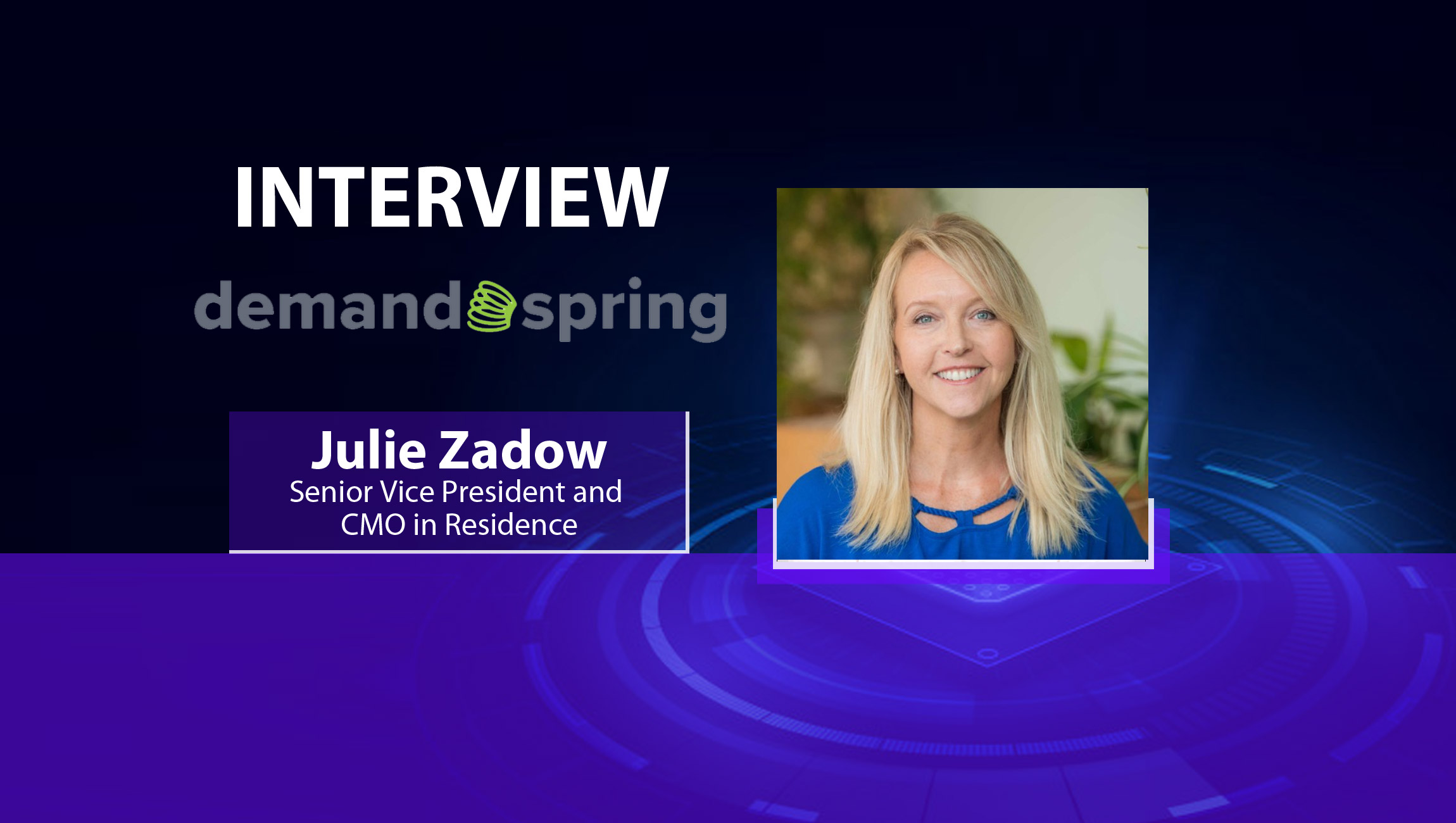What does it take for today’s B2B marketers to reshape their martech strategy and marketing plans for better alignment in order to scale business ROI? Julie Zadow, Senior Vice President and CMO in Residence at Demand Spring shares her observations and tips in this martech chat: _______ Well, after college and grad school, my first job was an entry level position at a big marketing agency in New York. I hated the job and decided advertising and marketing was not for me…and clearly I was wrong! It just took me about another decade of working to really find the kind of marketing that suited me best… In my case, I found my groove when I started marketing and producing large B2B events. I was energized by the work because each live event was — at its core — a giant marketing campaign with a hard and fast immovable deadline, ie, the date of the event. And that kind of marketing allowed me to tap into my innate default worldview, which is that perfect is the enemy of done. I mean — you can spend hours debating what tagline or which pantone shade of blue best suits your ad campaign, but at some point, that campaign just needs to get into the market and start driving engagement, especially if you know that campaign needs to drive 1000 event registrations in 12 weeks to turn a profit on your event. Event marketing was — and remains today — the epitome of what it means to embrace both the art and the science of marketing to drive results. So it was a fantastic place to grow as a performance-driven marketer. As I got more experienced and started leading teams of marketers, some of the best people I’ve ever hired were also marketers who had spent time in their career grappling with the challenge of live event marketing. To this day the most agile, collaborative, results-minded marketers I know almost always have at least one “tour of duty” as an event marketer. Large scale event marketing leadership also taught me the value of what I like to call “Grace under fire at all costs.” Live events are pressure cooker experiences — from the kick off planning meeting all the way through to the closing keynote speaker, and your successes and your failures are often on full display. And something always goes awry. Early on I learned the value of keeping my cool, modeling the calm I wished to see, and using each setback as a learning opportunity. That mindset is the one I still try to show up with every day. Marketing Technology News: MarTech Interview With Jonathan Epstein, CEO At Brewco Most marketing leaders I work with understand how critical it is to evolve their organization to keep pace with digital transformation. And of course that’s about addressing the digital skills gap, no surprise there. But modern marketing organizational design is about so much more than skills. It’s about rethinking our approach to things like collaboration, accountability and trust in the workplace. It’s about creating flatter layers and less hierarchy so we can truly operate as nimble decision makers. And it’s about honoring the leader in all of us, and creating cultures of learning that power how our teams evolve and grow. As one of Demand Spring’s Leap Advisors Carla Johnson explains in her recent book, this is ultimately about rethinking innovation. As our martech stacks have evolved and our access to customer data and insights has expanded, it’s high time for marketing leaders to step into the leadership space that allows them to own customer engagement at a corporate level. And marketing leaders need to evolve their team structures to support this evolution. From a marketing trend perspective, I believe one of the most critical competitive differentiators for CMO’s will be the ability to own strategy within the C-suite, and customer engagement needs to be the foundation of that strategy. In terms of differentiated skills from marketing teams, I think we’ll see more active recruitment of traditional sales and client service practitioners into marketing roles as this evolution finds its footing. Once marketing teams have re-shaped themselves to fully support foundational customer-driven strategy ownership, marketing can start really driving the growth agenda for the business. This is definitely the category of “the more things change, the more they stay the same.” For example, in my executive coaching practice I work with marketing leaders who are really grappling with challenges around owning the customer journey and creating a truly customer-first brand narrative. I’m seeing all kinds of new pressures arising for CMO’s when it comes to attracting and retaining talent, and I’m seeing many marketing leaders struggle with what it means to build an authentic brand that stands for something besides its own revenue growth. That being said, I wish this meant that the challenges of perennial issues like sales and marketing alignment, addressing the digital skills gap, and building the perfect martech stack were fading as new struggles take center stage. But the truth is the old and the new issues are battling each other for space on that center stage of what’s keeping marketing leaders up at night. I think marketing leaders looking to scale their operations and their teams need to honestly assess what’s driving that imperative. Is the goal to scale for the sake of process efficiencies, for organizational skills modernization, or to “skate to where the puck is going” as the business grows? Marketing leaders need to make sure they’ve got a clear scale driver that has C-Suite wide support and buy-in before they begin to scale. Even if this step in the process slows things down, it’s a critical step and it can’t be missed. CMO’s need to craft a clear and compelling internal storyline that is easy to understand across the business when it comes activating scale and growth. Make sure your internal stakeholders understand how that scaling moment is aligned with business goals, and take the time to build the buy-in as you go. Marketing Technology News: MarTech Interview With JR George, Administrative Vice President At Trustco Bank Now more than ever, marketing leaders are trying to leverage the power of technology and personalization to create seamless and real-time customer engagement experiences. This means that CMO’s have to figure out how to leverage something as impersonal as technology to infuse more humanity into their brands. That’s a tough challenge, but that’s where the new goal post sits for campaign best practices in B2B marketing. This is also the path to B2B revenue marketing results — the kind that proves marketing is not a cost center but a measurable driver of business growth. Aligning marketing technology with campaign strategy sits at the heart of B2B digital transformation — the holy grail for modern marketing leaders. However, without a solid foundation in place to support marketing transformation, CMO’s risk overpromising and under-delivering if they burn budget and resources on tech-driven transformation that the organization is not yet ready to fully leverage. Furthermore, aligning martech and marketing planning is an ongoing journey, and the most successful marketing leaders are mapmakers first and adventurers second. I think this journey requires marketing leaders to set really candid expectations with the C-Suite, and it sometimes means leaders need to have the courage to show the organization how to “slow down to speed up” the pace of innovation. Finally, when it comes to optimizing team efforts, the best marketing leaders I know show up every day bringing their A-game to drive team collaboration and growth. In my experience coaching CMO’s, the best of them embody leadership attributes that represent a blend of empathy, agility and accountability to model the kind of day-in, day-out human behavior that inspires genuine team engagement. These leaders know how to coach and guide their teams to feel empowered and supported as they stretch and learn and grow. Additionally, CMO’s who can cultivate a culture of continuous learning in their team structures will ultimately have the strongest, most capable, most adaptable teams who are poised to do incredible things — and maybe even have fun while they’re at it. Marketing Technology News: MarTech Interview With Massimo Arrigoni, CEO At BEE Demand Spring is an integrated Revenue Marketing consultancy that helps marketing organizations stand taller by enabling them to scale their ability to contribute to pipeline and revenue. Our team of Revenue Marketing Strategists, Content Marketers, and Marketing Technologists help our clients transform their marketing practices, deliver exceptional customer experiences, and drive revenue. Julie Zadow brings over 20 years of marketing leadership experience to her role as Demand Spring’s Senior Vice President and CMO in Residence. She has served as the head of Marketing and CMO for various software, services, and advisory organizations including Aberdeen Group, Harte Hanks, Globoforce/WorkHuman, and Alyce. She is also the Founder of PinchHitCMO, a fractional marketing leadership firm. Julie is deeply skilled in digital transformation strategy, modern marketing organizational design, and marketing employee engagement best practices. She also coaches marketing leaders to help them manage their tone, their teams and their time more effectively so they can become the best leaders they can be. Julie’s success as a marketing executive coach is rooted in her experience building marketing departments from the ground up, launching new brands within established companies, and partnering with C-Suite leaders to deliver marketing that drives business results.Welcome to this MarTech Series chat Julie, tell us about your marketing journey and key learnings through the years…
Can you talk about a few aspects of the modern marketing organizational design that you feel marketers of today need to be paying more attention to?
As marketing trends and martech evolves, there is a need for differentiated skills from marketing teams…How do you feel marketing teams need to shape up today to suit current business needs?
What are some of the top issues you see marketing leaders of today struggle with?
For marketing leaders who are looking to scale their operations and teams in 2021, what are the top thoughts you’d like to share with them?
What are the biggest marketing trends in B2B that you feel should take center stage in marketing campaigns through 2021?
Some top takeaways on aligning martech to marketing plans and optimizing team efforts and output.
Before any kind of marketing transformation goals can be set, marketing leaders need to take a hard look at their existing foundational tech stack. This needs to be a truly critical investigation of how well the marketing automation, CRM and web content management systems are working, and most importantly, how well they are working in concert with each other. This is also where data quality truths must be laid bare, since data quality will make or break the measurable success of any marketing campaign.
Before dedicating budget and resources to tech-driven marketing optimization, CMO’s must first ensure they have quality processes in place for onboarding new data, cleansing and appending old data, and understanding how data flows from one system or platform to the next. For example, machine learning and predictive analytics platforms are two of the most exciting hallmarks of the marketing transformation promise. However, an organization with flawed foundational processes for the capture and integration of prospect and customer data won’t benefit from an incremental investment in predictive analytics until they resolve their primary data pitfalls first.

What does it take to Drive Customer Success in B2B? Catch the latest marketing, sales and customer facing best practices from these podcasts with industry leaders!











